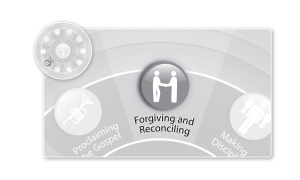 Pierce O’Farrill’s forgiveness of gunman James Holmes raised the question for us in our previous post, What exactly does it mean to forgive your enemy? In that post we attempted to piece together a possible definition of Christian forgiveness from O’Farrill’s comments to the Baptist Press and the Denver Post, one that included
Pierce O’Farrill’s forgiveness of gunman James Holmes raised the question for us in our previous post, What exactly does it mean to forgive your enemy? In that post we attempted to piece together a possible definition of Christian forgiveness from O’Farrill’s comments to the Baptist Press and the Denver Post, one that included
- lack of anger
- a prayerful attitude toward the offender
- pity and empathy
- a confident trust in the goodness and power of God to overcome evil.
Ken Sande, author of the seminal work The Peacemaker, commends four promises of forgiveness that do not invalidate O’Farrill’s concept but project forgiveness along a very different trajectory–one that draws upon a sustained and gospel-powered act of will that mirrors Christ’s own forgiveness of us:
[F]orgiveness may be described as a decision to make four promises:
“I will not dwell on this incident.”
“I will not bring up this incident again and use it against you.”
“I will not talk to others about this incident.”
“I will not let this incident stand between us or hinder our personal relationship.”
An equally thought-provoking definition of forgiveness comes from John Piper during a very challenging season for forgiveness at Bethlehem Baptist Church. Piper quotes the venerable Thomas Watson from three hundred years before:
[Watson] is commenting on the Lord’s Prayer, “Forgive us our debts as we for give our debtors,” and asks,
Question: When do we forgive others?
Answer: When we strive against all thoughts of revenge; when we will not do our enemies mischief, but wish well to them, grieve at their calamities, pray for them, seek reconciliation with them, and show ourselves ready on all occasions to relieve them. (Thomas Watson, Body of Divinity, p. 581)
O’Farrill’s thoughts, Sande’s promises, Piper’s precision–there’s enough here to last close to a lifetime of contemplation and productive action.
And yet…
Reading O’Farrill’s account–and even augmenting his definition with these tremendous additional insights–leaves me feeling we may be one principle short in our thinking about forgiveness.
One very important principle that stands to knock over–and then rebuild–the whole stack on a very different foundation.
More next post.











Inspirational indeed.keep them coming and God will bless u so much
May God bless you so much for such inspirational messages. Keep them coming